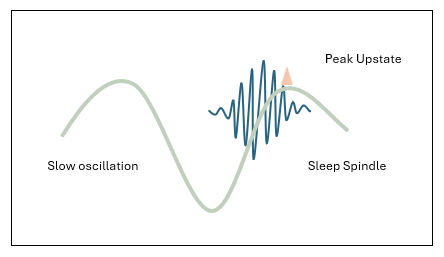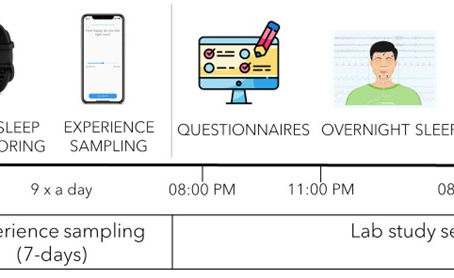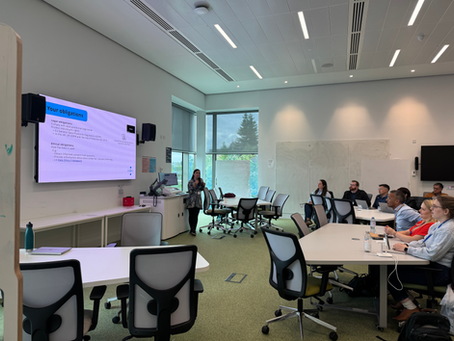top of page
CIRCADIAN MENTAL HEALTH NETWORK


Our 2025 Newsletter
Welcome to our Newsletter! It has been a busy year for the Circadian Mental Health Network, from our first ever conference to the completion of our Priority Setting Partnership. For more detail on some of the things we have been working on, check out our other blog posts. The First Circadian Mental Health Network Conference In June, we hosted our first Circadian Mental Health Network Conference in Edinburgh. Over the two-day event, we were extremely excited to welcome Networ

Amy Ferguson
Dec 16, 20255 min read


Novel targets for memory impairment in depression: Harnessing the potential of coupled sleep oscillations
Memory problems are common in depression and affect daily life, but they are not well understood and therefore go untreated. During sleep two natural brain waves (sleep spindles and slow oscillations) play a key role in transferring new memories to long-term storage. Recent research suggests these sleep-related brain waves may be disrupted in depression, potentially impairing memory functioning. This pilot study explores how these brain waves impact memory in young people wit
Alexandra Stainton
Dec 10, 20254 min read


How Poverty Shapes the Genetic Links Between Sleep and Mental Health
Research Spotlight Blog No. 12 Dr. Marina Xavier Carpena is a Visiting Professor at the Federal University of Rio Grande (FURG, Brazil), a postdoctoral researcher and collaborator of the Human Development and Violence Research Centre (DOVE) at the Federal University of Pelotas. Her research focuses on genetic epidemiology of mental and sleep traits, and how the role of socioeconomic adversity and biological vulnerability in shaping developmental outcomes. Marina is also commi
Marina Carpena
Dec 4, 20253 min read


SubSleep: Understanding subjective experiences of sleep in people with bipolar disorder
Research Spotlight Blog No.11 Raahat Manrai is a postdoctoral researcher working at the Division of Psychiatry, University of Edinburgh. She has expertise in conducting qualitative research and incorporating lived experience within scientific research using participatory research methods. She is currently working on AMBIENT-BD research study aiming to investigate sleep and circadian rhythms in bipolar disorder. Full disclosure before venturing deep into this blog post- I am
Raahat Manrai
Nov 17, 20253 min read


How Our Internal Clock Affects Our Mood
I study how the body’s internal clock—known as the circadian system—affects mental health, with a focus on depression. Although disruptions in circadian rhythms have been linked to depression, it remains unclear which alterations are most relevant and whether they play a causal role. I use a combination of methods, including self-report questionnaires, actigraphy (to track activity), and biological markers such as melatonin, cortisol, and body temperature.
Valentina Paz
Nov 14, 20254 min read


Radar Sensing for Sleep Research
Regular and sufficient sleep is crucial for healthy living and to promote positive mental health. Typical methods used to study changes in our sleep, such as activity bands or diaries, are not always well-tolerated by many individuals especially for extended periods of time. Therefore, contactless radar-based sleep sensors provide potential for continuous measurement of sleep for many months. We aim to explore if radar sensors are feasible and accepted by adolescents.
Lorna Caddick
Nov 10, 20254 min read


Circadian disturbances as pathophysiological mechanisms of mood disorders
Mood disorders are very different from person to person, which makes it hard to find the right treatment. My research focuses on a particular subtype of mood disorder that seems to be linked to problems with the circadian rhythm, our body’s internal 24-hour clock. People with this “circadian type” of depression appear to have unique genetic risk patterns and often don’t respond as well to standard antidepressants.
Emiliana Tonini
Nov 3, 20254 min read


Bridging Digital Health, Sleep Science, and Maternal Mental Health: My Personal Story
I study how sleep and daily activity patterns, captured through wearable devices, might reveal early signs of mental health issues in young people with a genetic condition linked to psychiatric risk. I’m also working to apply these insights to maternal mental health, aiming to create digital tools that help mothers monitor and improve their sleep and wellbeing, especially in low-resource settings.
Abiola Saka
Oct 29, 20253 min read


Sex differences in melatonin suppression: understanding the role of sex hormones
Light affects not only how we see but also how our body functions: it influences sleep, alertness, and hormone rhythms. This research explores how sex hormones (e.g., oestrogen, progesterone, testosterone) change our sensitivity to light. We test how light affects pupil responses and the hormone melatonin in women with natural menstrual cycles, women taking the contraceptive pill, and men.
Carolina Guidolin
Oct 27, 20254 min read


Tired Minds, Stubborn Emotions: How Does Sleep Shape Our Daily Mood?
Everyone experiences sadness, but for some, negative moods (e.g. feeling down) are difficult to shake off. Understanding why negative moods persist and how to manage them is key to mental health. This study examines how sleep influences daily moods using both real-world and lab-based methods.
The study aims to identify ways to enhance mood through better sleep.
Emma Sullivan
Oct 24, 20254 min read


Using big data and genetics to understand how insomnia impact the relationship between depression and type 2 diabetes
Ever noticed how depression and diabetes are besties in the worst way? Scientists have been puzzled over why these two love to tag along together. While risk factors like body mass index play some role in this, another major culprit might be sleep. Sleep problems like insomnia seem to fuel this toxic relationship, increasing diabetes risk in people with depression and vice-versa.
Renu Bala
Oct 22, 20254 min read


Finding Our Rhythm: The Role of Circadian Science in Mental Health
Problems with sleep and our body’s internal clock can influence mood and trigger relapses in bipolar disorder. Traditional ways of measuring this are complicated and only capture short snapshots of time. In Ambient-BD, we are testing radar sensors that quickly track sleep and circadian timing at home over 3 months. By comparing these to gold-standard methods, we aim to better understand how daily rhythms affect mood and wellbeing to find better ways of supporting people with
Emma Ryan
Oct 20, 20254 min read


Investigating the molecular mechanisms of circadian rhythms in bipolar disorder
Bipolar disorder (BD) is a severe mood disorder with episodes of mania and depression. Disruption of circadian rhythms (the 24-hr internal clocks that maintain functioning) is likely a key feature. Lithium is a BD treatment, but how this works is unknown.
We aim to understand circadian dysfunction in BD and how Lithium corrects this.
Sally Harwood
Oct 17, 20254 min read


The great time debate: What does the science say about daylight saving time (DST) and our health?
Twice a year we change our clocks for DST, but does this affect our health? This looks at all the scientific evidence to see if shifting the clock has an impact on things like our risk of a heart attack, traffic accidents, or how much sleep we get. Ultimately, our work is clarifying the true impact of the clock change so we can have a more informed public discussion about DST.
Aiste Steponenaite
Oct 15, 20252 min read


Top 10 Research Priorities for Mental Health and the Body Clock
One of the main objectives of the Circadian Mental Health Network is to set the research agenda in the field of mental health and...

Amy Ferguson
Oct 10, 20254 min read


World Mental Health Day: ECR Research Spotlight
This World Mental Health Day, we are excited to announce the launch of our ECR Research Spotlight series. We wanted to shine a light on...

Amy Ferguson
Oct 10, 20256 min read


Reflections on Our First Data Anonymisation Workshop
Earlier this June, the Biological Research Data management team ( BioRDM ) delivered our first-ever workshop on data anonymisation at...
BioRDM Management Team
Sep 2, 20252 min read


Data Sharing: The Missing Key to Advancing Circadian Rhythm and Mental Health Research
Imagine spending weeks—or even months—collecting data around the clock, only for it to sit unused after your study is published. It’s a...
Haya Deeb & Sophie Faulkner
Mar 18, 20255 min read


ECR Awardee Blog 8: Launching a Global Survey
Dr Mirim Shin is a research fellow with the Youth Mental Health & Technology Team at the Brain and Mind Centre, University of Sydney,...
Mirim Shin
Jan 31, 20253 min read


ECR Awardee Blog 7: The Power of Personal Experiences
Dr Ilaria Pina is a Research Associate for the WHOLE-SMI project at Newcastle University working in the area of health inequalities to...
Ilaria Pina
Jan 21, 20253 min read
bottom of page